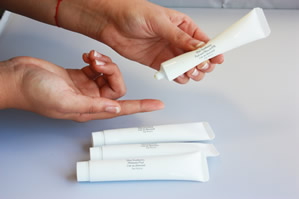
Azelaic Acid Cream
Formulation: Azelaic acid in varying strengths for treating acne and rosacea.
Formulations:
Azelaic Acid 15%, Niacinamide 4% Cream
Azelaic Acid 20%, Niacinamide 4% Cream
Description
These formulations contain two effective ingredients for treating skin conditions such as acne, melasma, and rosacea – azelaic acid and niacinamide.
Azelaic acid has antimicrobial and anti-inflammatory properties that are useful for treating acne. Bacteria on the skin lead to breakouts and subsequent inflammation. In addition to treating acne, some doctors prescribe this medication for reducing the appearance of acne scars.
Due to its anti-inflammatory properties, azelaic acid is also used for treating rosacea. Rosacea involves flushing of the face – redness and often lesions. Azelaic acid has been shown to be effective at treating rosacea and may be a good first-line treatment before systemic medications are tried.
For melasma, azelaic acid can stop the production of melanin in the skin and has been shown to work as well as other popular lightening creams like hydroquinone. It may also have fewer side effects compared to hydroquinone – for example azelaic acid has less of a risk of bleaching the skin in an undesirable way.
What are the Ingredients in This Formulation?
Azelaic Acid
Azelaic acid is a natural dicarboxylic acid that has a few important effects in the skin that make it a useful treatment for melasma, rosacea, and acne. It has antibacterial, keratolytic, comedolytic, and anti-inflammatory properties. It is considered a natural acid because it is found naturally in wheat, rye, barley, and other plants as well as a product of yeast found on normal human skin. Azelaic acid has been used for decades and is one treatment option for skin conditions that can be used during pregnancy.
Improvements with azelaic acid cream typically start to occur within 3 to 6 weeks after beginning treatment.
Niacinamide
Niacinamide, also called nicotinamide, is a form of vitamin B3 found in green vegetables, yeast, meat, and milk. It has been shown to produce a variety of positive effects when applied topically to the face including improvements in acne, melasma, and rosacea. Even for patients without one of these skin conditions, topical niacinamide can improve blotchiness and redness, minimize pore appearance, protect against sun damage, and minimize fine lines and wrinkles.
What Conditions Does This Formulation Treat?
Melasma
Azelaic acid has a cytotoxic effect on abnormal melanocytes. It competitively inhibits tyrosinase and also inhibits reactive oxygen species that are a part of the process of melanin production in the skin. Because of these effects it is frequently used topically for treating melasma. In studies it has been shown that 20% azelaic acid produces similar results to hydroquinone 4% and sometimes performs better than hydroquinone for treating melasma.
Niacinamide has been shown to reduce the mast cell infiltrate and showed improve solar elastosis in melasma skin. Pigmentation of melasma patches has been shown to decrease with the use of topical niacinamide. It is effective and also produces fewer side effects than hydroquinone, although it may require a longer treatment period before results are noticed.
Rosacea
Azelaic acid decreases the expression of kallikrein 5 and cathelicidin, two important components of the inflammatory cascade in rosacea. It has been demonstrated that azelaic acid reduces or completely eliminates rosacea in 70-80% of patients. This includes a reduction in both inflammatory lesions and redness. Niacinamide has been shown to have anti-inflammatory properties that may help improve rosacea symptoms.
Acne
Acne is an inflammatory disorder of the skin where the pilosebaceous units are affected. It may involve clogged pores due to excess sebum production, dead skin cells, and dirt, inflammation from acne-causing bacteria, and more. More than a mere “cosmetic” condition, acne has the potential to seriously affect a person’s life. Chronic acne has been associated with higher incidences of depression, stress, and anxiety.
Azelaic acid treats acne by inhibiting the thioredoxin reductase enzyme of Propionibacterium acnes (P. acnes) that affects the inhibition of bacterial DNA synthesis which occurs in the cytoplasm. The reduction in acne-causing bacteria helps clear current breakouts and prevents new breakouts from occurring. Unlike some antibacterial treatments for acne, the use of azelaic acid does not result in bacterial resistance. In addition it does not cause photosensitivity in the same way as some topical medications.
Niacinamide helps with acne by reducing sebum production, reducing inflammation, and inducing some skin lightening to reduce pigmentation changes from acne.
Side Effects of Azelaic Acid
Generally azelaic acid cream is well tolerated by patients, with the most common side effects being localized itching, redness, and irritation. These side effects usually are not significant enough for the patient to discontinue the medication. Compared to some topical medications for skin conditions that involve hyperpigmentation, azelaic acid has less risk of bleaching, bacterial resistance, and development of new discolorations. Unlike some treatments for acne, azelaic acid can be used during pregnancy.
Articles
Interventions for rosacea – Cochrane Library
New Insights Into Azelaic Acid – Practical Dermatology
Topical Treatments for Melasma and Their Mechanism of Action – Journal of Clinical and Aesthetic Dermatology
Rosacea Management – Skin Appendage Disorders
Formulation, characterization, and in vitro testing of azelaic acid ethosome-based cream against Propionibacterium acnes for the treatment of acne – Journal of Advanced Pharmaceutical Technology and Research
Azelaic acid – DermNet
A Double-Blind, Randomized Clinical Trial of Niacinamide 4% versus Hydroquinone 4% in the Treatment of Melasma – Dermatology Research and Practice
Order Azelaic Acid Cream
Question about azelaic acid cream? Reach out to us today:
